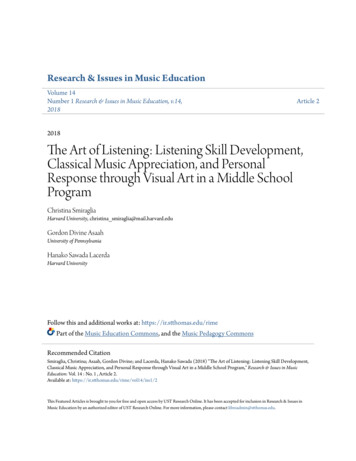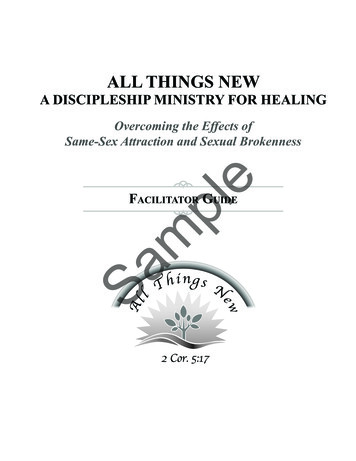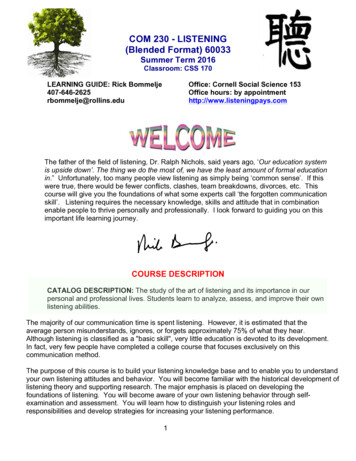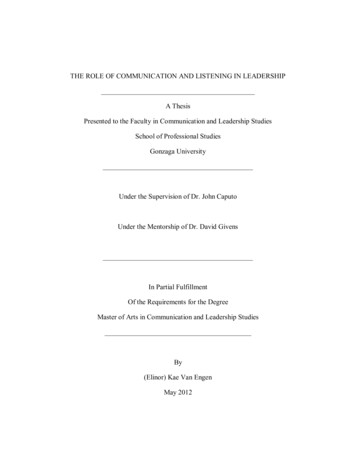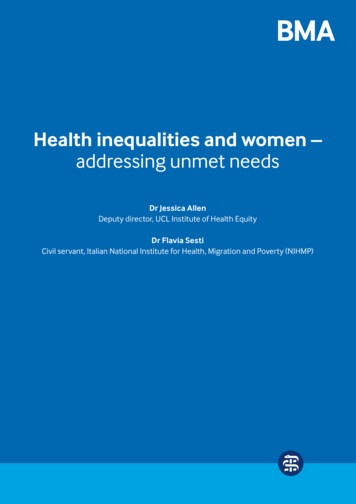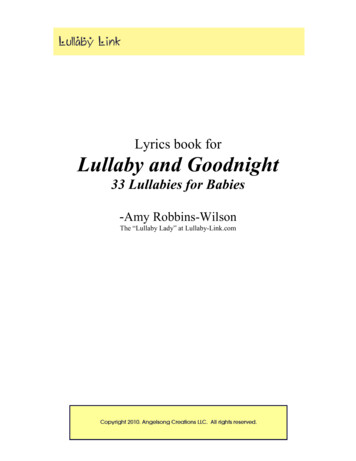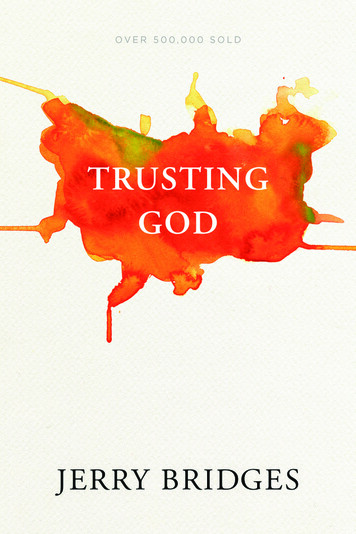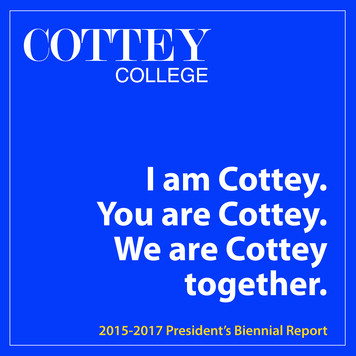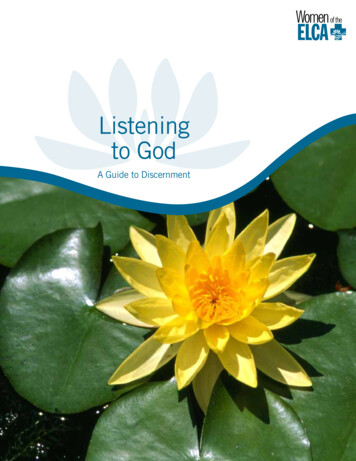
Transcription
Listeningto GodA Guide to Discernment
Listening to GodA resource from Women of the ELCAAbout the AuthorDebra Farrington—an insightful writer and popular retreat leader—is the former publisher ofMorehouse Publishing and the former manager of the Graduate Theological Union Bookstore inBerkeley, California. She is the author of Hearing with the Heart: A Gentle Guide to DiscerningGod’s Will for Your Life and Learning to Hear with the Heart: Meditations for Discerning God’sWill, as well a several other books of Christian spirituality. She has also written for a wide varietyof publications including The Lutheran, Spirituality and Health, Catholic Digest, PublishersWeekly, and others.?wonkuoyDidWomen of the ELCA resources, suchas this one, are available free to individuals,small groups, and congregations. Coveringa variety of topics, we are bringing Lutheranperspectives and new voices to issues thatmatter. By making a donation to Women of theELCA, you will help us continue and expandthis important educational ministry. Give onlineat womenoftheelca.org or mail to Women of theELCA, ELCA Gift Processing Center, P.O. Box1809, Merrifield, VA 22116-8009.Developed by Women of the Evangelical Lutheran Church in America.Design by Union Design, Inc.Copyright 2013 Women of the Evangelical Lutheran Church inAmerica.May be reproduced for use in Women of the ELCA units, clusters/conferences and synodical women’s organizations provided eachcopy is reproduced in its entirety, unless otherwise indicated by thematerial, and carries this copyright notice. Please direct all otherrequests for permission to reproduce to women.elca@elca.org.2
Listeningto GodA Guide to DiscernmentContentsHow to use this resource.page 4session 1Discernment and the Hearing Heart.page 5session 2Paying Attention, Studying,and Discernment.page 8session 3Recognizing the Roadblocksto Listening.page 11session 4We Are Co-creators with God.page 13session 5Using Our Gifts in the World.page 16session 6Listening to God’s Hopes for Us.page 18Handout .page 193
Listening to GodA resource from Women of the ELCAHow to use this resourceTime RequiredThese six sessions serve two purposes. First, theywill introduce each woman in your group to some ofthe tools she needs as an individual for discerningGod’s hopes and desires for her life. Second, thesesame tools will be used to help the group as a wholeto discern what their gifts are for ministry within yourcongregation or in your community.1.5 hours per session.The suggested times may be altered to meet theneeds of your group.This resource has been developed and excerptedfrom two other resources written by Debra Farrington:Hearing with the Heart: A Gentle Guide to DiscerningGod’s Will for Your Life, and Learning to Hear withthe Heart: Meditations for Discerning God’s Will.Both books were published by Jossey-Bass, and thesesessions were developed with their permission to usethe materials within. Both of these books provideaccessible and helpful information on discernmentand would be useful c ompanions to the material inthis resource.This resource may be used as a congregational unitprogram, as part of a cluster or conference event, oras part of a synodical women’s convention. The sixsessions may be conducted over six weeks or over thecourse of a weekend, perhaps as a retreat.The format is also flexible depending on the size ofyour group. For small groups, try shared leadership,giving all participants a copy of the entire resource.For larger groups, assign a facilitator for each sessionand allow the facilitators to decide how to conducteach session. Have copies of the handout ready whenneeded.4
Listening to GodA resource from Women of the ELCASession One: Discernment and the Hearing HeartThis session introduces the concept of discernment and some of the skills needed for listening to God.minutes to consider this, open up the floor toconversation, using the following questions orothers of your choosing. (10-15 min)The session will last approximately 1 hour.Materials needed: paper and pens or pencilsfor anyone who wants to make notes of theirobservations How do you define discernment? What have been your own experiences withdiscernment in the past?Allow at least 10 minutes for the conversation. If thegroup is large, you may wish to break into smallergroups so each person has a chance to share herthoughts.STEPS FOR THE FACILITATORWelcome everyone to the session, and openthe session with this prayer. (2 min)Almighty God, in whom we live and move and haveour being, you have made us for yourself, so that ourhearts are restless till they rest in you; grant us purityof heart and strength of purpose, that no passion mayhinder us from knowing your will, no weakness fromdoing it; but in your light may we see clearly, andin your service find perfect freedom; through JesusChrist our Lord. Amen.— Augustine of HippoRead or summarize the following introductionto what discernment is, after everyone hashad a chance to share her thoughts. (5 min)DISCERNMENTSolomon hadn’t been the king for very long when Godappeared to him in a dream one night. “Ask what Ishould give you,” God said (1 Kings 3:5). Differentversions of the Bible translate what Solomonrequested as wisdom, or as an understanding mind orheart, but the actual translation of the Hebrew saysthat Solomon asked for a “hearing heart.” In otherwords, Solomon wanted a heart that listened well, sohe could discern well.Read or summarize the followingintroduction. (2 min)We’re going to be exploring the concept of discerningGod’s will, a way of listening to God both individuallyand as a group within our own congregation. Each ofus—as individuals and as groups—has different gifts,all of them valuable. In these sessions, we’re going towalk through a process of discerning our own gifts aswell as the gifts of our group, gifts that are uniquelysuited to our place and time and that God hopes wewill use well. But before we begin reading or hearingwhat others have to say about discernment, let’s takea few moments to think about our own understandingof discernment.For the ancient Hebrews, the heart was more thanan organ. The heart was thought to be the centerof everything physical, intellectual, emotional, andspiritual. So when Solomon asked for a hearing heart,what he wanted was for God to inform every aspect ofhis life so that he could be a wise and faithful king.Hearing hearts—listening hearts—are not reservedfor kings alone. We too can ask for and receive thegift of a hearing heart so that we can discern welland judge rightly. And that’s what this program willbe about—learning to listen with our hearts so wecan judge rightly.Invite everyone to consider her own definitionof discernment during a couple minutes ofsilence. After everyone has had a couple5
Listening to GodA resource from Women of the ELCAin prayer is critical if we want to hear God’s answer tothat prayer.You’ve probably heard the word “discernment” usedprimarily in relationship to a clergy person’s call orvocation. Or perhaps you’ve heard people talk aboutdiscernment at a major crossroads in their lives. ButGod invites all of us to discernment, not only for bigdecisions but also for the whole of our lives, for thedaily things as well as the big stuff.Many people dislike silence. It makes us edgy. Notmuch seems to be happening. But with practice,maintaining stillness grows easier and richer. LikeElijah in 1 Kings 19, we often discover that God isnot in the wind, fire, or earthquakes of our lives, butin the voice that comes in the quiet.The word “discern” comes from the Latin discernere,which means “to separate apart.” From all theoptions in front of us, and from all the informationthat comes to us each day, we “separate apart”those things that seem to be God’s unique callto us. So how we treat others, how we vote, howwe use our time, talent, and money, and how wecare for ourselves and the details these involve allrequire the practice of discernment. By learning topractice discernment in everyday life, we’ll be farbetter equipped to hear God’s guidance at any majorcrossroads we reach. We will develop some “musclememory,” just like athletes. They practice their skillover and over again, until the body does what theywant it to do without their even having to think aboutit consciously. Discernment requires the same kindof practice. Doing it regularly, in the daily course ofour lives, equips us to practice it under high-stresscircumstances when we need to.A prayerful and discerning heart also needs to let goof its own agenda and recognize that God’s will mightbe different from ours. That doesn’t mean we haveto stop praying for others—far from it. God desiresall our prayers, for ourselves and for others. But thehearing heart recognizes that it does not always knowwhat God’s will is and opens itself to accepting thatfact. It gives up directing God and instead learns tolisten for God’s voice in prayer.Guide the group through the followingexercise. (10 min)One way of practicing openness to God’s will inprayer is to simply hold mental images of those youare concerned about, as well as yourself, in God’slight without asking for anything. Try this:In this session and the next, we’re going to look atfour areas that help us to be better listeners: prayer,attention, study, and community. Sit in a comfortable position that supports yourback and allows good blood circulation so thatyou can sit in silence for the next five or tenminutes. Take a few deep breaths and focus on relaxingyour body and letting go of whatever to-do lists orother concerns are on your mind. If the to-do listskeep coming to mind, just let them know thatthey’re important but that you’ll get to them later. Find an image of God’s love that works for you.That might be picturing God’s love as a brightlight or as God’s open hand waiting to receiveyour concerns. Use whatever image suggestsGod’s receptivity to you. Without asking for anything, name the peopleor situations that you wish to hold before Godand imagine them being held in God’s lovingpresence. You might see them wrapped in brightStop for a moment or two and ask for anyquestions or comments so far. (5 min)Read or summarize the following introductionto prayer. (2 min)PRAYERThe hearing heart listens for God’s voice prayerfully.The words we use in prayer are important andnecessary in discernment, particularly when we areinviting God to speak about God’s desires for us. Butlearning to listen—practicing silence and stillness—6
Listening to GodA resource from Women of the ELCAWhen the conversation slows down, close thesession by inviting everyone to rest in silencefor a minute or two. Then read the followingfrom Psalm 62:1–2.light, for instance, or being cradled in God’shand. Hold them there for as long as you wish,and then move on to the next person or situationyou wish to place before God. You can include all sorts of people and events inthis exercise: individuals who are in need of help,countries where people are at war or starving,political situations, those suffering after a naturaldisaster, and even those who are experiencinggreat joys. Finally, hold yourself in God’s presence withoutasking for anything in particular. If any thoughts,hopes, or wishes come to mind, make a mentalnote of them. When you are done, conclude with a brief, silentprayer of gratitude for God’s loving presence in allof these situations.For God alone my soul waits in silence;from him comes my salvation.He alone is my rock and my salvation,my fortress; I shall never be shaken.Invite the members of the group to discusstheir experience with the previous exercise.(15-20 Min)Questions for group discussion: How did it feel to do this prayer exercise? Did you find it freeing or frustrating to not askGod for anything in particular? How did you feel about praying in this way foryourself? Did any hopes, desires, or wishes come to mindas you prayed for yourself or for others? How might this kind of prayer help you withdaily discernment about the choices you facein your life, such as those surrounding career,relationships, family issues, or other personalconcerns?7
Listening to GodA resource from Women of the ELCASession Two: Paying Attention, Studying, and DiscernmentIn this session, we’ll explore three other skills we need for daily discernment: attention, study, and spiritualcompanionship.Not all physical sensations are about discernment,of course. People catch germs, and people get sick,and many times that has nothing to do with beingin or out of alignment with God. But when we’re notdealing with a particular illness, sometimes thesebody reactions can be good teachers for us.The session will last approximately 1 hour.Materials needed: some objects from nature,at least one per person. These might be rocks,flowers, twigs, gourds, fruits, vegetables, andother similar things. paper and pens or pencils for each personInvite members of the group to shareobservations about how their own bodiescommunicate with them. What do theyexperience when they are stressed? What dothey experience when they are relaxed and atpeace? (5-10 min)STEPS FOR THE FACILITATORWelcome everyone to the session, and thenread or summarize the following material onattention. (5 min)Invite the group to try the following exercise,the Prayer of Examen, as a way of payingattention to God in daily life. (10-15 min)ATTENTIONMany of us were taught as young children not toboast or to make ourselves the center of attention.Modesty is an important social skill, but sometimeswe take it too far and forget to notice the unique giftsGod gave us. Learning to pay attention to our giftsis essential if we want to discover the clues to God’sdesires for us, as individuals and as a group. Notbeing able to name and claim our gifts is a little likeleaving a table full of wrapped presents from God onthe table without opening them.PRAYER OF EXAMENBeginning to notice God’s guidance and listeningmore consciously to it in daily life can be learnedthrough the practice of the Prayer of Examen, anancient Christian practice.Begin by sitting in a comfortable position. Close youreyes, and breath naturally. Try to clear your mind ofthe day’s concerns. (Allow a brief period of silence.)Begin to look back over the activities of the last24 hours, from what you were doing before youbegan this exercise to what you were doing this timeyesterday. Think about the people you met, the thingsyou did, the places you went, the conversations youhad, and so on. (Give people a few minutes to dothis.)In Western culture we’ve also learned to ignore ourbodies and what they have to tell us. Good discernerslisten to the wisdom their bodies teach. Our bodiesoften know if a decision is right or wrong for uslong before we know that intellectually. Shallowbreathing or tension in your neck or jaw may be signsthat you’re on the wrong path. An overall feeling ofwell-being, deep breaths, and relaxed shoulders maybe signs that you’re more in alignment with God’sdesires for you.As you consider the things you did over the lastday, look for those times when you felt you wereresponding to the world around you in a way thatseems to be in accordance with God’s hopes and8
Listening to GodA resource from Women of the ELCASTUDYdesires. Make a list of the things you did or said thatseem consistent with God’s will for you and for theworld, no matter how inconsequential they may seemto you. (Give people a few minutes to do this.)To be good discerners, we also need to learn moreabout God and how God works. When we don’t readthe Scriptures more fully, as well as other books thathelp us expand our childhood understandings of God,we’re left with a God that is too small, too boxedin, tobe a good partner in discernment. God works in moreways that we can imagine. If Moses hadn’t been opento God working in all sorts of ways, he might not haverecognized God in the burning bush. So we need tocontinue to expand our horizons, not only by readingbut by looking for God’s guidance in art, music, film,and even the objects and creatures in nature. Godleaves clues about right living all over the place.Now, make a second list of the times in the last 24hours when you felt you were resisting God’s desiresfor you, when you were moving away from God. If youwish, make some notes about what you feel may havecaused you to move away from God—fear, anger,frustration, pain, or whatever. Take a few momentsat the end of making this list to silently ask for God’sforgiveness, and allow yourself to remember that Godhas mercy on us and loves us, even when we separateourselves from God temporarily. (Give people a fewminutes to make the list.)Finally, sit quietly for a couple of minutes and listenfor God’s response to you, whether that comes asthoughts, emotions, or perhaps a physical sensationof peace, excitement, or something else.EXERCISEHave some objects from nature in the room on atable where everyone can see them (e.g., flowers,twigs, rocks, leaves, gourds, fruits, vegetables, andthe like.) Ask each person to select an object, takeit to her seat or other comfortable place for aboutfive minutes, and make a list of the things shemight learn from that object. Everything God hascreated has something to teach us. (For example, arock worn smooth might teach us about the processof life wearing us smooth; a rose might teach usthat beauty and thorns exist in the same object; andso on.)At the end of the practice, engage thegroup in a conversation around some of thefollowing questions. (10 min) Were you surprised at how often you felt andfollowed a sense of God’s will for you over the lastday? What things did you do or say that you might nothave recognized at the time as responses to God’shopes for you, but in retrospect now seem to beresponses to God? How did this kind of prayer increase your senseof conscious awareness of God’s desires for you? What implications does this kind of prayer havefor listening to God and responding to God inyour daily life? Invite people to share what they might learnfrom the object they choose. (10 min)Is there anything that someone wants or needs toshare?Read or summarize this section on study.Then follow with the exercise. (10 min)9 How can we learn not only from books but fromeverything that exists? How can this expand our perspective and makeus better discerners in our own lives?
Listening to GodA resource from Women of the ELCAWhen the conversation winds down, close thesession with this prayer.May the strength of God pilot us,may the power of God preserve us,may the wisdom of God instruct us,may the hand of God protect us,may the way of God direct us,may the shield of God defend us,may the host of God guard us againstthe snares of eviland the temptations of the world. Amen— St. Patrick10
Listening to GodA resource from Women of the ELCASession Three: Recognizing the Roadblocks to ListeningThis session will help participants begin to identify the obstacles that prevent us from listening to God andfollowing God’s will.to do that sometimes. It seems simpler to just makethe decisions we need to make, to muddle along asbest we can, rather than take the time to stop, listen,and wait until our hearts hear more clearly.The session will last 45 minutes to an hour.Materials needed: paper and pens or pencils for those who wantto make notes of their observations enough popular magazines and newspapersso that there is at least one for each person.(Select magazines that make women theirprimary audience: fashion, housekeeping,news, and others) a flip chart or large piece of paper and amarkerThere are many obstacles to listening for God inour lives. Some of them come from our own uniquelife experiences, and others come from the culturearound us. There are also times when we hear butaren’t ready to respond. In this session, we’ll look atone source of obstacles to listening and responding.Sometimes recognizing and naming the obstaclesthat keep us from working with God can help us bemore attentive to God’s hopes and desires for us.Introduce the following activity. Inviteeveryone to take one or two of the magazinesor newspapers available and tear out fiveads that appeal to them or that caught theirattention. Ask each woman to list the productor service that each ad is promoting, as wellas the benefit that the company is promoting.(20 min)STEPS FOR THE FACILITATORWelcome everyone to this session and invitethem to sit comfortably for a few momentsin silence. During that silence, suggest thatthey try to let go of whatever to-do lists theyare carrying around in their minds, and relax,focusing on just being present in this timeand space. (5 min)For instance, a car company may be promoting a newmodel that will make you the envy of all your friends.A computer company might be promoting a computerthat is so small and lightweight that you can take itanywhere and can work all the time.Read or summarize the following introductionto the session. (5 min)Teresa of Avila, a sixteenth-century saint, wrote aprayer that talks about how difficult it can be tolisten for God. She wrote: “Although I have oftenabandoned you, O Lord, you have never abandonedme. Your hand of love is always outstretched towardme, even when I stubbornly look the other way. Andyour gentle voice constantly calls me, even when Iobstinately refuse to listen.”After everyone had made their lists,go around the room and invite each womanto share two or three (or more if you havetime) of her ads and the benefits they arepromoting.Listening for God’s voice and desires in our lives ishard work, so it’s no surprise that we forget or neglectIt may be helpful to make a list of the products andbenefits on a large piece of paper or a flip chart soeveryone can see it.11
Listening to GodA resource from Women of the ELCAOnce you have this list, engage the group inconversation about what they see there, usingthe following questions or others of yourchoosing.(15-30 min) Are any of these benefits and values too farfetched to be taken seriously? Are these benefits and values consistent withScripture and with God’s will? How are they consistent or inconsistent with whatGod asks of us? How does seeing ads like this in the media(television, radio, magazines, newspapers, online,billboards) affect people’s ability to hear andfollow God’s will? Aside from the messages we get from thebusiness world and media about what items,services, and values we should want, what otherfactors in our lives prevent us from hearing withour hearts?When the discussion is winding down, closethe session with the following prayer.Grant me, O Lord, to know what I ought to know,to love what I ought to love, to praise what delightsyou most, to value what is precious in your sight,to hate what is offensive to you. Do not allow me tojudge according to the sight of my eyes, nor to passsentence according to the hearing of my ears; but todiscern with a true judgment between things visibleand spiritual, and above all things, always to inquirewhat is the good pleasure of your will.— Thomas à Kempis12
Listening to GodA resource from Women of the ELCASession Four: We Are Co-creators with GodThis session explores the concept of being a co-creator with God and how we can do that in our own lives andin our congregations.Perhaps it seems prideful to think that you have arole to play in bringing about the kind of world thatGod truly desires. But you bear no more and no lessresponsibility than every other living being in theworld. God desires that we all play our part in helpingto build the world God desires. Just as we want whatis best for our children, our partners, and our closefriends, God wants what is best for everyone in theworld and asks our help in making this a reality. Soeach of us must take responsibility for listening forGod’s guidance and acting on that guidance.The session will last approximately 1 hour.Materials needed: paper and pens or pencils handout (see page 21)STEPS FOR THE FACILITATORWelcome everyone to the group, and open thesession with this prayer. (5 min)Lord, help us today to realize that you will bespeaking to us through the events of the day, throughpeople, through things, and through all creation. Giveus ears, eyes, and hearts to perceive you, howeverveiled your presence may be. Give us insight to seethrough the exterior of things to the interior truth.Give us your Spirit of discernment. O Lord, you knowhow busy we must be this day. If we forget you, donot forget us. Amen.— Sir Jacob Astley (1579-1652), adaptedRead or summarize the followingintroduction. (5 min)Talk about discernment often seems to imply that itis always about life’s big decisions—like marriage,career, children—and it is. But we don’t need tosave discernment just for those big situations.How and when to pray; how to treat others; howto nurture friendships, our spiritual lives, ouremployees and colleagues; how to vote; how to helpthose in our communities who have few resources;and how to spend the money we have are allactivities and decisions that benefit from listeningfor God’s hopes and desires. In this way, each of usis called to be a partner, or co-creator, with God inbuilding up our world.The evening news once featured a story about thewind being able to bring dust from Africa to Colorado.No country or people can isolate themselves aseasily as they might think. Acting, or not acting, onGod’s behalf works much the same way. When wedo something hateful, hurtful, and cruel to someoneelse, that act, or the spirit of it, spreads from thevictim to someone else—and it ripples outward likethe waves made by a stone thrown in a pond. Whenwe practice kindness, concern, and graciousness, thesame is true. It spreads to others. Each act is just asmall thing, but those acts can either further God’swill or help to defeat it. By acting as God would haveus act, we become God’s hands, feet, and voices.Read the following quote to the group andask for their comments. (10 min)Catholic priest William Barry says that when wegive up trying to help and write off the possibilitiesof our being co-creator with God as naïve, doing so“sanctions the status quo of mistrust and enmitybetween people whom God wants to be brothers andsisters, and it takes us off the hook of trying to findways to live out God’s dream.” (William A. Barry,Paying Attention to God: Discernment in Prayer.Notre Dame: Indiana, 1990, page 60.)13
Listening to GodA resource from Women of the ELCAenjoys, while another woman finds that she is goodat working with numbers, but it bores her. For thefirst woman, working with numbers is a gift; for thesecond, it is a skill.Questions for discussion: Do you agree with Barry that we must find waysto be co-creators with God? In what ways have you seen yourself, our nation,or other people or groups ignore God’s desiresand by doing so become the gateway to mistrustand hatred among people? How do you feel about being responsible forbeing a co-creator with God?Read or summarize the following material.(5 min)[Note: Some people in your group may already haveworked on recognizing or naming their gifts in anearlier program. You may also have people in yourgroup for whom this material will be new. In the nextsection, help those who were not a part of earlierdiscussions about gifts to “catch up” with others whohave already thought about this. And encourage thosewho may have thought about their gifts in previousyears to be open to re-thinking those—they may havechanged some. Focus as well on the differencesbetween skills and gifts, which will be explored hereand is likely to be new material for everyone.]GIFTS AND SKILLSOne of the ways in which we can respond as cocreators is by recognizing the gifts that God gaveus to work with. We’ve all heard about gifts in thechurch. The New Testament is full of references tothe many gifts that God has given us to use. But whatwe don’t always think about is the difference betweengifts and skills.The use of our natural or inborn gifts—whateverthey may be—engage our joy, creativity, andenergy. Skills, on the other hand, are learned anddeliberately developed. Skills, like gifts, can beabsolutely anything, since one person’s skill could beanother person’s gift. One woman may find workingwith numbers to be an innate gift that she reallyOur inner resources can become drained when weexercise our skills too often; our internal reservoirsget emptied. But when we use our gifts more thanour skills, we feel alive and energized; our innerresources seem boundless and constantly refilled.When we use our gifts more than our skills, we don’tburn out easily because in using our gifts, we arefollowing God’s call. We are gratefully using the giftsgiven us by God to be who we are called to be, ratherthan trying to be something that we are not.Invite the group to be silent for a little whileand make individual lists of things theyconsider their gifts, and things that seemmore like skills to them. (5 min)After they have completed this, ask them togather in small groups of two to four peopleand follow the instructions below, also foundon the handout. You may either write theseinstructions on paper for everyone to see, ormake copies of the handout to give to eachmember of the group. (20 min) If you are willing, read your list of gifts and skillsto the group. Ask others in the group to add to your list anygifts they have noticed. After each woman has had a chance to read herlist and get feedback from the others, discusshow using your gifts makes you feel versususing your skills. What are the similarities anddifferences? How can you use your gifts more often than yourskills in your own life?Bring the groups back together, and ask forany general observations that people wish toshare. (1
The hearing heart listens for God’s voice prayerfully. The words we use in prayer are important and necessary in discernment, particularly when we are inviting God to speak about God’s desires for us. But learning to listen—practicing silence and stillness— in prayer is critical if we w

